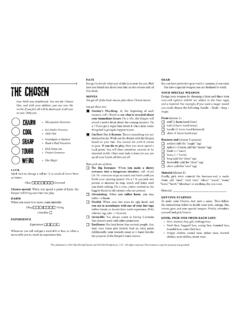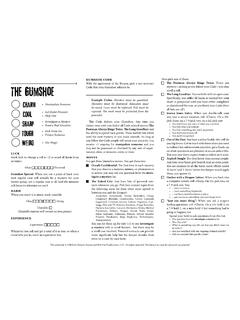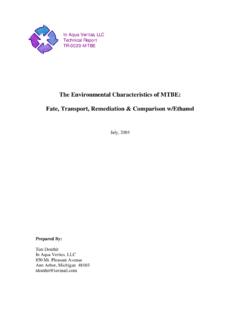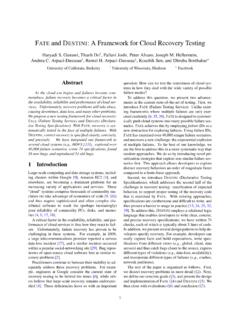Transcription of Being a compilation of musings concerning the Fate RPG ...
1 Being a compilation of musings concerning the fate RPG done by RobertHanz on Google+.Collected by Tomasius , 20140909 What's Fate?A few posts have got me thinking about this, and it's a thought that's been inmy head for a while in other ways - mostly around the whole "if you'rehacking, what are the 'safer' things to hack, and at what point are you muckingwith the base assumptions of the system?"Much like +Ryan Macklin's post, I tend to think of Fate as Being a specificgame, that does specific things. It can cover a wide variety of settings, but itdoes so in a very Fate-like way. There's things Fate is super-awesome at, andthings that Fate isn't super-awesome at. When I want to do something thatFate isn't super-awesome at, I tend to just pull out a game that is super-awesome at don't consider that a negative on Fate in any way.
2 I have a JeepWrangler. It's good at some things (transportation), awesome at other things(off-roading), and absolutely sucky at certain things (hauling lots of things,carrying lots of people, going fast). And making my Wrangler better at thosethings would almost necessarily make it worse at the things it does really wellright I don't use Fate to play D&D. I might use Fate to run a game in a D&Dsetting, but I don't think it would feel much like the D&D game - I'vepreviously described what I think it would be as more like "D&D: TheMovie: The Game" (no, not the horrible movie, but an imaginary good one).Yeah, I could hack Fate enough to run a passable "D&D game", butwould it still be Fate in any recognizable way?
3 I don't think it would, becausethe core questions and assumptions of D&D are very different than those ofFate. Which, again, isn't a knock on Fate or on D&D, much like saying thatmy Wrangler isn't as fast as a Ferrari isn't a knock on my , what are the things that I consider to be "Fate"? Not as some kind ofpurity test, but rather as a more general gauge - if I see a Fate build that hits95% of these, it'll probably "feel like" Fate to me. But if I see something that'sostensibly Fate that only hits 10% of things, it probably won't push those Fatebuttons very charactersThis is, to me, one of the biggest. Fate characters are proactive. They makethings happen. The game progresses as a result of their seems like all games, but it's really not - it's an argument thatrailroading doesn't belong in Fate games.
4 If you know what's going to happen,then at some level the characters aren't proactive. They're just looking for themagic "next scene" button. They have no real agency. And some games andstyles are built heavily upon this kind of game structure. Which is fine - I justdon't necessarily think it's a good fit for also makes it a good question whether investigation-based games are asuper-awesome fit for Fate, either. Investigation-based games are usuallyabout following the breadcrumb that is left, which is often not very proactiveon the part of the players. It also makes the level of narrative control that Fategives players somewhat charactersFate characters are competent. They're good at stuff. Maybe not the best inthe world, but whatever they're good at, they're good at it.
5 They're notbumbling , aspects, compels, invokesTo me, this is the core of Fate. You can get rid of stunts and still have it "feellike" Fate, but if these four elements don't work more or less how they do inCore, it doesn't feel much like Fate to phase trioThis has been around, and almost unchanged, since SotC. It works, and how itgenerates interlinked characters is, to me, a pretty important part of the of charopAs a game, Fate seems to almost go out of its way to minimize characteroptimization. Discussion of what stunts do is directly opposed to the idea of"hey, let me find the combination of stuff that makes me awesome", as ageneral table veto is built into the process."Final" skillsOne of the things I really appreciate about Fate is the idea that skills representyour final ability to influence a scene - not your base ability that's thenmodified by a gazillion other factors.
6 This ties in pretty heavily with thecharop point of emphasis on system masteryFate is, to me, not a game about learning to manipulate the game system. It's agame about the fiction (as in, the stuff we're imagining in our heads), not therules. The rules get out of the way more than anything, and it's hard to havesystem mastery be important if you're trying to de-emphasize the to make Fate "crunchy" (that is, to make system mastery a moreimportant thing) to me make games feel less like , not gatesScenes in Fate games to me work best as a series of possible 're not challenges to be overcome. If there's a 95% chance of success atno cost, there's no real point in having a on opportunity costThis is a big one to me.
7 Unlike games that focus on system mastery andovercoming challenges, Fate to me works best when opportunity cost isshoved in the players' faces. That's a question that appears over and over inFate - spending Fate points to buy a victory, success at a cost, acceptingCompels - all of these point directly at the idea of "how much do you wantthis, and what are you willing to give up to get it?"If a Fate game de-emphasizes this, to me it starts to feel less like to Fate that do things like require the pre-spending of Fate Points or thelike feel less-"Fate" to focus on what's important in the story, not modeling realityIf you think on most fiction, the weapon that a given combatant uses isn'tparticularly relevant most of the time.
8 The fact that someone uses an axe vs. asword isn't going to mean that they lose in a scene. Sure, there are specialpieces of equipment, but they tend to be just that - me, a good Fate game approaches its systems in that way - what'sactually important, in this genre? Do characters tend to lose fights becausethey're not armed with bigger weapons or sturdier armor? If not, then thatshouldn't be how your game models it, good example of this is thinking about mecha. How many stats should amech have, and how much of its combat ability should be based on it insteadof its pilot? And that boils down to - 'what story are you telling'? If it's aboutthe pilot, and a good pilot in a weak or mediocre mecha can still be aneffective combatant, then the mecha should only have a modifying impact onthe pilot's skills, and the story will focus around the pilots.
9 But if the storyshould focus around the attainment of awesome mecha, then they should havea larger impact. It's not a matter of what's "realistic". It's a matter of "whatimpact does this have on the game, and what elements do I want to beimportant in the game?"Active instead of passive bonusesA big thing with Fate, to me, is the idea that most bonuses are active - they'rethe result of things that you do. This fits in with the "proactive" part ofcharacters as well. This compares to other games where much of the game isfocused on "how many bonuses can I find a way to make apply?" That can bea great type of game - but it ain't (to me) tied to results, not actionsAnother biggie. In many games, using a skill means you're engaging in aspecific task that may have a variable result.
10 In Fate, I see it more as "I'mtrying to accomplish this - do I succeed?" It seems subtle, but it's a prettyimportant point, and colors how a lot of mechanics get curve resultsFate uses a randomization scheme that is heavily biased towards "average"results. It doesn't use a flat distribution. How that is specifically achieved, orexactly how biased it is, is somewhat more open - but a flat distributiondoesn't feel like Fate to , those are the main things I can think of, at least for now. I'm sureI'll add more later!And these are just my opinions. They're not the word of God, and otherswill absolutely have different lists, and even things that they think I just gottotally wrong. But, to me, this is kind of the core of what I consider to be"Fate" - and, if you look at it, a good predictor of what games I'll generallysay don't feel "Fate-like" to the Heck am I Doing This?













